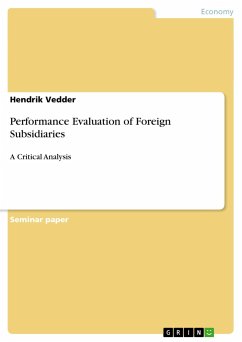Today, Multinational Corporations (MNCs) spread their value chains across the globe and foreign subsidiaries play a crucial role in creating value within and for the MNC. While some MNCs are aware of their subsidiaries' performance, others only have a vague idea. Research findings in this area are scarce and it is still little known on how different subsidiaries should be evaluated in order to maximize their contribution to the performance of the MNC as a whole.
Katharina Kretschmer aims at filling this research gap. Qualitative case studies are used to analyze performance evaluation within MNCs empirically. The author shows that role differentiation exists within one MNC when subsidiaries with different strategic roles are identified. Furthermore, patterns are discovered in their performance evaluation. Deep insights into the implications of subsidiary roles are displayed, and it is demonstrated that role-specific subsidiary management is possible, if not necessary. In the future, MNC managers could benefit even more if, instead of treating all their subsidiaries alike, they approached them differently - especially when evaluating their performance.
Katharina Kretschmer aims at filling this research gap. Qualitative case studies are used to analyze performance evaluation within MNCs empirically. The author shows that role differentiation exists within one MNC when subsidiaries with different strategic roles are identified. Furthermore, patterns are discovered in their performance evaluation. Deep insights into the implications of subsidiary roles are displayed, and it is demonstrated that role-specific subsidiary management is possible, if not necessary. In the future, MNC managers could benefit even more if, instead of treating all their subsidiaries alike, they approached them differently - especially when evaluating their performance.









